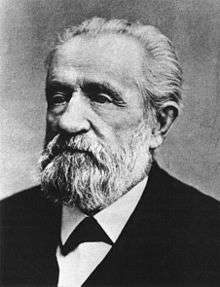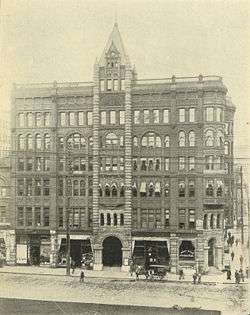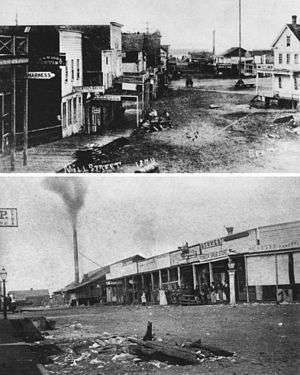Henry Yesler
Henry L. Yesler (December 2, 1810 – December 16, 1892) was an entrepreneur and a politician, regarded as a founder of the city of Seattle. Yesler served two non-consecutive terms as Mayor of Seattle, and was the city's wealthiest resident during his lifetime.[1]
Henry Yesler | |
|---|---|
 | |
| 7th Mayor of Seattle | |
| In office 1874–1875 | |
| Preceded by | John Collins |
| Succeeded by | Bailey Gatzert |
| 15th Mayor of Seattle | |
| In office 1885–1886 | |
| Preceded by | John Leary |
| Succeeded by | William H. Shoudy |
| Personal details | |
| Born | December 2, 1810 Hagerstown, Maryland United States |
| Died | December 16, 1892 (aged 82) Seattle, Washington United States |
| Resting place | Lake View Cemetery, Seattle, Washington |
| Nationality | American |
| Domestic partner | Sarah Burgert |
| Occupation | Entrepreneur, Politician |
Biography
Yesler arrived in Seattle from Ohio in 1852[2] and built a steam-powered sawmill, which provided numerous jobs for those early settlers and Duwamish tribe members. The mill was located right on the Elliott Bay waterfront, at the foot of what is now known as Yesler Way[1] and was then known as Mill Road or the "Skid Road," so named for the practice of "skidding" greased logs down the steep grade from the ever-receding timber line to the mill. In running the mill, Yesler built the city's first water system in 1854. The system was made up of a series of open-air, V-shaped flumes perched on stilts that started atop First Hill and ran down past Yesler's residence and to the mill. Later on, after complaints of dirty water, Yesler developed a system made up of log pipes and iron buried beneath the ground.
.jpeg)
In 1858, Yesler's wife Sarah joined him in Seattle, and the couple lived in a simple house across from the mill.[2] Prior to her arrival, Yesler fathered a child named Julia with the fifteen-year-old Native daughter of a local Duwamish hereditary chief.[3]
.jpeg)
Yesler also served in public office, at various times as a county auditor, county commissioner, and mayor.

On June 6, 1889, the Great Seattle Fire destroyed the entire business district (which consisted mainly of wooden buildings), including Yesler's sawmill, Yesler's Hall,[4] a theater on the corner of and 1st Avenue, and Yesler's Pavilion, a civic center[5] on 1st and Cherry Street. They were never replaced. In 1892, Yesler erected the Pioneer Building on the same plot of land where his first home stood, now the heart of Seattle's Pioneer Square. Sarah Yesler had died in 1887, but Yesler built a large new mansion and shared his mansion with a younger female relative (some sources describe her as a maid), whom he married five months later.[6]

Yesler died on December 16, 1892, at the age of 82. He is buried in Seattle's Lake View Cemetery. After his death, Yesler's mansion became the first home of the Seattle Public Library, and burned down on January 2, 1901. The King County Courthouse currently occupies the site.[4]
Personality
In his informative and tongue-in-cheek book, Sons of the Profits, columnist and Seattle historian William C. Speidel pointed out some of Yesler's negative aspects. On numerous occasions, Yesler had lawsuits filed against him. On other occasions, it was Yesler himself doing the suing. "The City of Seattle made him a millionaire," wrote Speidel, "yet he sued it...fought it...plundered it...and on two occasions he brought it to the brink of bankruptcy." Speidel also recounts how, according to courthouse records, Yesler owed John McLain, an old friend from Ohio, $30,000 for the loan that the latter set up for construction of the mill. Yesler would pay him $12,000 of it over time, and it wasn't until McLain sued him that he was able to collect on the rest.[7]

Yesler and his wife Sarah were Spiritualists and believed in free love.[8]
References
- Keniston-Longrie, Joy (2009-07-01). Seattle's Pioneer Square. Arcadia Publishing. ISBN 9780738571447.
- "Ten who shaped Seattle: Henry Yesler struck gold in lumber and real estate". seattlepi.com. Retrieved 2018-01-12.
- Thrush, Coll (2007). Native Seattle: Stories of the Crossing-Over Place. Seattle: University of Washington Press. p. 57. ISBN 9780295741345.
- "Yesler's Hall | Seattle Theatre History". www.seattletheaterhistory.org. Retrieved 2018-01-12.
- "Site of Yesler's Pavilion - Seattle, WA - Washington Historical Markers on Waymarking.com". www.waymarking.com. Retrieved 2018-01-12.
- "Temporary housing after Seattle's Great Fire". The Seattle Times. 2012-06-22. Retrieved 2018-01-12.
- Speidel, William (1967). Sons of the Profits. Seattle: Nettle Creek Publishing Company. pp. 57–80.
- Kathie M. Zetterberg with David Wilma, Henry Yesler's Native American daughter Julia is born on June 12, 1855, HistoryLink.org Essay 3396, 2001-07-30. Accessed online 2013-01-16.
Further reading
- Speidel, William C. (1967). Sons of the Profits (There's no business like grow business: the Seattle story, 1851–1901). Seattle: Nettle Creek Publishing Company. pp. 57–80, 256. ISBN 0-914890-00-X.
Speidel provides a substantial biography with extensive primary sources. - James R. Warren, "Ten who shaped Seattle: Henry Yesler struck gold in lumber and real estate", Seattle Post-Intelligencer, September 25, 2001.
- Junius Rochester, Yesler, Henry L. (1810–1892) HistoryLink.org ("The Online Encyclopedia of Washington State History"), October 7, 1998, revised by Walt Crowley on October 17, 2002.
Writings
- Yesler, Henry (1907). Daughter of old Chief Seattle. Coast Pub. Co.Available online through the Washington State Library's Classics in Washington History collection
External links
- Finding aids from the Special Collections, Washington State Historical Society (WSHS). Includes a finding aid on Henry and Sarah Yesler, available as a PDF or a Word document.
- Henry Yesler at Find a Grave
| Political offices | ||
|---|---|---|
| Preceded by John Collins |
Mayor of Seattle 1874–1875 |
Succeeded by Bailey Gatzert |
| Preceded by John Leary |
Mayor of Seattle 1885–1886 |
Succeeded by William H. Shoudy |